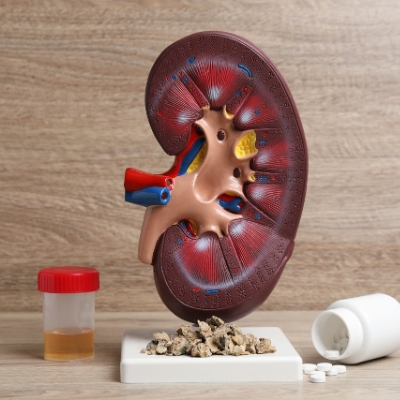Kidney Stone Treatment
Do you get the urge to pee a lot, and does it hurt when you pee, or do you feel stabbing pain in the back? If the answer to these questions is yes, then chances are you might be suffering from kidney stones. If you are searching for kidney stone treatment in Indore, then consult Dr. Saurabh Chipde, one of the best kidney stone specialists in Indore.

What Are Kidney Stones?
Kidney stones are hard deposits of minerals and salts that form inside your kidneys. They can vary in size, from as little as a grain of sand to as big as a ping-pong ball.
These stones are composed mainly of calcium, but they can also be made of other substances like uric acid or chlorine. When they move through your urinary tract, they can cause severe pain and other symptoms.
Symptoms of Kidney Stones:
The symptoms of kidney stones can include:
If you're noticing any of these symptoms, it's important to consult a kidney stone specialist in Indore like Dr. Saurabh Chipde, who specializes in minimally invasive urology treatments to address these issues effectively.
Why You Should Not Ignore Kidney Stones?
Ignoring the signs of kidney stones can cause serious health complications, including
Intense pain: The pain from kidney stones can be so severe that it disrupts your daily life and activities.
Infection: Untreated kidney stones can block urine flow, leading to infections that can spread to the kidney’s bloodstream.
Kidney Damage: Prolonged obstruction can cause permanent kidney damage, reducing their ability to function properly.
Kidney Stone Treatment Options
Treatment for kidney stone varies depending on the size, location and the severity of your symptoms. Here are some common treatment methods:
Hydration and Pain Management: Increasing fluid intake and using pain relievers can help pass smaller stones naturally.
Medications: Certain medications can help relax your ureter, making it easier for stones to pass.
Shock Wave Lithotripsy (SWL): This non-invasive procedure uses sound waves to break up the stones into smaller pieces that can be passed easily.
Ureteroscopy: A thin scope is inserted into your urethra and bladder to remove stones or break them up using laser technology.
Percutaneous Nephrolithotomy (PCNL): A technique used to remove specific stones in the kidney or upper ureter that are too large for other forms of stone treatment, such as shock wave lithotripsy or ureteroscopy.
Surgery: In rare cases, large stones may require surgical removal.
If you are experiencing the pain of kidney stones, you are not alone. Kidney stones are one of the most common urological problems in both men and women, but the good news is that you can be easily treated with the right kidney stone treatment.
How to Prioritize Kidney Health in Indore?
Maintaining kidney health is essential for overall well-being. Here are some tips to help reduce the risk of kidney stones and promote kidney health:
Don’t let fear keep you from seeking help. Consult Dr. Saurabh Chipde for kidney stone treatment in Indore to address your kidney stones, prevent complications, and help you return to a pain-free life.
FAQ’s
Depending on the size and location, your doctor might recommend a treatment suitable for your condition.
Lithotripsy or Extracorporeal Shock Wave Lithotripsy (ESWL) procedure uses sound waves to create strong vibrations that break the stones into small pieces that can be passed in your urine.
Most kidney stones in their initial stages can be treated without surgery. Most stones will pass by themselves within three to six weeks. Still, depending on their size and location, surgery may be necessary.
The first warning signs of kidney stones are:
- Pain in the back, belly, or side.
- Pain or burning during urination.
- Urgent need to go to pee.
- Blood in the urine.
- Cloudy or smelly urine.
- Fever and chills.
- Nausea and vomiting.
It is important to be mindful of the following foods that can cause the formation of kidney stones in certain people- Foods high in sodium include cola beverages, fast foods, processed meats, chocolate, spinach, soy milk, almonds, cashews, and soybeans.
It is important to understand that while some patients may benefit from walking or exercising to pass their kidney stones, some patients will not. It is important to note that it may not help all the patients pass stones.
